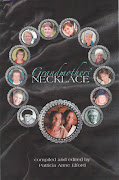It was Remembrance Day on Friday in Canada and Veteran’s Day in the United States. I imagine many bloggers posted about their personal connections to soldiers and war heroes from battles world wide. My family lacks a strong military tradition and yet I choke up every November 11th when I hear “And The Band Played Waltzing Matilda”. That song more than any other conjures up the senselessness of war and its inevitability. A sense of loss haunts me.
My father, Jakiem (Jack) Zaryski grew up in a war zone. Born in 1911 in Kasperivtsi, a small village in Western Ukraine, he remembered soldiers of all stripes marching back and forth through the village during his childhood in World War One. Families were forced to billet soldiers and were subjected to their abuses. His mother was shot in the hip by a trigger-happy German when she stooped to pick up a fallen door knob. Dad spent hours hiding in root-cellars when the shelling was heavy and playing war games with other children when the activity subsided. He began to smoke at age ten and later developed a stomach ulcer. You can be sure he was affected by this early trauma and his anxieties, in all likelihood, were passed down to his children.
During this time my paternal grandfather, Joseph Zaryski was conscripted by the Austro-Hungarian Army around 1914 and spent six years fighting on the Eastern Front then later working in Vienna during the subsequent civil uprisings in Ukraine. I know nothing of his military record, only that he would have been the lowliest foot soldier and fodder for the enemy. How he managed to return unscathed is a mystery I will never unravel. My grandfather never shared his war stories with my father. They are lost forever.
 |
| Joseph Zaryski c. 1920 |
During World War Two my father was in Canada, married with a child, me. He never wanted to go to war after what he had witnessed in his childhood. Instead he chose to go to work on the Alaska Highway being built by the United States as a defense to any attack from the east. Perhaps he felt he was doing his patriotic best. His absence during my early life left its mark on me.
On my mother’s side her youngest brother Leon and a brother-in-law enlisted during World War Two. I was born in 1941 so my only memory is of the two uncles staying with us at different times as they passed through Toronto en route to training camp or returning from overseas. My only war time memories are of Yonge Street parades, rationing tickets for butter and meat and the fact that there weren’t many service aged men around the streets in my neighbourhood of downtown Toronto. That and the absence of my father when I was a toddler.
In my husband’s family many more men served their country. His father Ray Jackson was only 17 when he enlisted in World War One. A strong surge of patriotism and obligation swept the country and made young men feel the need to go to war to defeat ‘the Hun’. He served in France, was shot in the shoulder, and spent years recovering in a military hospital in England in the pre-penicillin age. His wounds never stopped bothering him and he never spoke of his experience.
My husband’s mother had two brothers who served at the same time during World War One. Her favourite, Bill Skilling, enlisted in the army and as a university graduate, was sent to Oxford for officer training. As a Second Lieutenant he was assigned to artillery (Canadian Expeditionary Force, British Expeditionary Force, Royal Field Artillery) as a Forward Observation Officer. In 1917 in France after the first phase of the Third Battle of Ypres (The Battle of Passchendaele), Bill collapsed on the field and was taken to hospital in England. He was sent home three years later depressed and with a badly damaged heart which eventually killed him prematurely. He never married because of his health.
When the war broke out, my mother-in-law’s other brother Harold enlisted in the 5th Field Ambulance Corps as a stretcher bearer. After being seriously wounded at the Battle of the Somme in 1916 he was sent to England. When he recovered he transferred to the Royal Flying Corps but never flew a mission because the war ended just as his training finished. I don’t know how the war affected Uncle Harold. He never spoke of it to us. But when he returned to Canada, he broke up with his high-school sweetheart who'd stayed faithful, and never explained his actions.
How did war affect my family? I'm grateful we didn't lose anyone close, like so many families. But it's a loaded question. We know that some family members were traumatized by war. We do know that trauma can lead to personality changes and behaviors that seem normal, but can be traced to terrible events suffered particularly in childhood or at an impressionable period of life. Their trauma in turn affects their spouses, children and grandchildren. The ripple effect steadily moves through the generations.
How has war affected your family?
How has war affected your family?
For more on Bill and Harold Skilling, see my other blog: http://www.skillingfamilymemories.blogspot.com/





